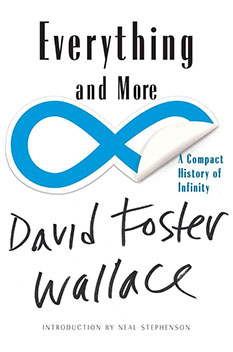Apropos of nothing

Apropos of nothing, I note the following quote from p. 12 of DFW’s Everything and More: A Compact History of Infinity: “One thing is certain, though. It is a total myth that man is by nature curious and truth-hungry and wants, above all things, to know.” (Italics in original.) In the accompanying footnote, DFW attributes the “myth” to Aristotle. Contrast this with Lonergan’s Insight, relying on Piaget’s account of childhood development, who takes it as a given that humans have an innate and unrestricted desire to know and that any compromise of that initial position is the result of what he calls “distortions” introduced by external influences (e.g. socialization, political pressures, etc.). It’s possible to reconcile these views by suggesting that DFW’s comments arise from observations of adult cognition which, more often than not, is subject to Lonerganian distortions.
It reminds me of my ongoing tracking project of the word “incurious” which I have once again encountered, first in Middlemarch, Chap. XXXVII:
“The vision of all this as what ought to be done seemed to Dorothea like a sudden letting in of daylight, waking her from her previous stupidity and incurious self-absorbed ignorance about her husband’s relation to others.”
And again in a piece in Brick #109, Yvette Greslé’s “Time through a Flower”, quoting a Virginia Woolf journal entry (March 11, 1935) on seeing her friend Vita Sackville-West:
“My friendship with Vita is over. Not with a quarrel, not with a bang, but as ripe fruit falls. But her voice saying ‘Virginia?’ outside the tower room was as enchanting as ever. Only then nothing happened. And she has grown very fat, very much the indolent county lady, run to seed, incurious now about books; has written no poetry; only kindles about dogs, flowers, and new buildings. Sissinghurst is to have a new wing; a new garden; a new wall.”
What these views have in common is the belief that someone who has become incurious has surrendered something fundamental. A loss of engagement with the world signals a failure of engagement with the self. Or something like that. In any event, the incurious are insufferable and one must avoid a similar fate at all costs.
Apropos of Everything
When I noticed DFW’s book on infinity sitting all alone (1 is the loneliest integer) on the book shelf in my local used book store, I was curious. Aha! you say, How very good of you to be so engaged with the world of books and broadening your mind and all that. Well, yes and no. On the one hand, I have read pretty much everything DFW wrote and have enjoyed his oeuvre (I love working the word “oeuvre” into a sentence) immensely and assumed that this book would fall in line with the rest of his fiction and journalism. On the other hand, I don’t know anything about mathematical concepts. Oh, sure, I took Functions & Relations, and Calculus, too, in Grade 13 (back when Ontario high schools taught the equivalent of first year university math courses), but I went straight into an English Lit major with minor in Classics and promptly forgot everything I had every learned about Cartesian coordinates and Limits and Integral calculus and whatever. I guess you could say that in the set of all things it’s possible to be incurious about, I was incurious about the subset of math which meant that when I went to undergrad parties hosted by math nerds, I was insufferable. Unfortunately for me, I never went to any such parties and so never had anyone to do me the kindness of telling me how insufferable I was at those parties.
Still, I took home the book and began to read it without understanding that, before he ever pursued a career in “normal writing”, DFW got himself a degree in modal logic, that this is not a book by a literary type offering his “perspective” on the development of infinity as a mathematical concept but, instead, that this is a book by an insider with an insider’s knowledge and an insider’s facility with specialized insider vocabulary. The book claims to be a book of general interest to general readers with lots of IYI (if you’re interested) interpolations to sweep along the uninitiated in its arcane slipstream. Although I felt thoroughly at sea (continuing with the slipstream metaphor), having read to page 12 and fearing I’d be shamed as someone with an incurious mind, I carried on in what I can only describe as the reading equivalent of a hacker’s brute force attack to decode the material. Imagine someone (me for example) reasonably literate in his native tongue (English) who takes up a volume in a language he knows nothing about (Danish, for example) yet reads the entire 305 page volume in spite of himself. It’s almost like reading Finnegan’s Wake.
Maybe I exaggerate. After all, DFW is a novelist and instinctively he does tell a story that follows a grand narrative arc. Yes, he forces me to traverse great deserts of higher math, but he does tell a story. It’s the story of the German mathematician, Georg Cantor (1845-1918) who laid the foundations of set theory and transfinite math. Later in his career (when he was about my age) he was hospitalized in a sanatorium, suffering from severe depression, and he ultimately succumbed to a heart attack while in hospital. However, in order to make sense of Cantor’s discoveries, you have to understand everything that preceded him, starting with the Pythagoreans who insisted that no math could be expressed without a correlate in geometry, an insistence that, in some measure, is responsible for the fact that they never developed a concept of infinity.
Born in 490 BCE shortly after Pythagoras died, the Greek philosopher Zeno gives us our first glimpses of infinity. Interestingly, his glimpses move in two directions, offering a view of both the infinitely large (which we now express as ∞) and the infinitely small (which we now express as 1/∞). Zeno’s paradoxes, which come to us from Aristotle, illustrate both concepts. So, for example, he offers an argument against size. Every object projects an outer part. By way of illustration, think of the human body and its skin. But the outer part itself projects an outer part. Think of how skin cells have cellular walls. In turn, this second order outer part projects an outer part. And so on. By this reasoning, all objects must be infinitely large. Zeno’s argument against motion takes us in the opposite direction to the infinitesimally small. In order to cross a room, we must first cross half that distance. In order to cross the remaining 1/2 room, we must cross half that distance again. In order to cross that half distance we must cross half of the half. And so on. Therefore we cannot cross the room because it would take forever.
It turns out that Zeno’s paradoxes are paradoxes only because, at the time he invented them, both he and his peers (people like Socrates and Plato) lacked the conceptual tools to resolve them. Practical experience tells us there must be something wrong with Zeno’s logic. After all, our bodies aren’t infinitely large. And crossing a room doesn’t force us to traverse infinitesimally small distances. Aristotle tried to answer Zeno’s logic by introducing a distinction between actuality and potentiality, but that strikes me as less an argument than a repetition of the observation that there is an obvious distinction between practical experience and conceptual constructs.
It is now generally agreed that Georg Cantor finally developed the conceptual tools to put Zeno’s paradoxes to rest. As I personally lack the brain power to understand the details, I defer to someone who does. In his book, A Brief History of the Paradox: Philosophy and the Labyrinths of the Mind, Roy Sorensen offers a concise non-technical summary of Cantor’s solution:
“Zeno mistakenly assumes speed limits. People can go fast enough to perform a hypertask in which infinitely many acts are performed in a finite interval of time. You exit a room by acting more and more quickly. You move halfway in ten seconds, then next half in five seconds, the next half in 2.5 seconds, and so forth. In twenty busy seconds, you are across the room.”
In part, the solution means that speed doubles as distance halves. With the notion of the hypertask, Cantor takes us over the final hump which is that, at infinitesimal distances, we reach infinite speeds. I can walk fast, but not that fast.
DFW accompanies us from Zeno to Cantor, along the way introducing us to all the various mathematical concepts that necessarily precede transfinite math. Admittedly, it was slow going. By the time I’d finished half the book, I thought to myself: Christ, this is taking me forever to read! Even so, I carried on through the next half of the book. And when I finished half of that, I again thought to myself: Christ, this is taking me forever to read! Even so, I carried on through the next half of the second half of the book. And so on. Thanks to Cantor, I was able to complete the book instead of languishing forever between a diminishing number of pages.
Apropos of something
Through brute force, I completed a book about a subject matter I don’t even have the tools to discuss much less comprehend. And yet I did it. This raises the obvious question: why bother with such a seemingly fruitless task? It reminds me of the question people once posed to my parents (or so they tell me) when they took my brother and me with them on their trips: why travel with your children when they’re too young to get anything out of it? Since my parents were both pedagogues, they answered from the perspective of childhood development: our learning begins before our consciousness of learning begins; we simply have no idea how pre-conscious learning contributes to our capacity to learn about our world; better to err on the side of caution and assume the boys will get something out of travel, even if all they do is drool and fill their diapers.
The same may be said for my reading of DFW’s paean to infinity. It’s impossible to say how much I might get out of it, but I’d like to think that I get more than nothing from it, although less than everything. In the spirit of the book, I might express this in mathematical terms:
0 < My understanding of Everything and More < ∞
My understanding falls somewhere better than nothing but less than everything, and that is something. But there are other reasons for making such an effort, and these reasons go to the very heart of why we read in the first place. I plow my way through a difficult text as penance for my sometimes arrogant belief that mine is the only (or at least the best) way to encounter our world. With every page, it reminds me, as much as I would wish it otherwise, that I am not the smartest man in the room. Whether it presents to me as a novel, or as a non-fiction narrative, or as an academic journal, or as technical report, I am ever in need of the humbling reminder that there are vast swaths of thought for which I have neither the lifespan nor the ability to comprehend. But, as with my infant self travelling with my parents, my limitations don’t preclude me from taking the trip anyways and at least looking on in wonder. The opportunity to stare in wonder always justifies a fruitless task.
